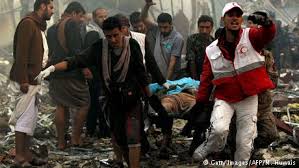Yemen: Coalition Blockade Imperils Civilians
YemenExtra
SH,A,
The Saudi-led coalition’s broad restrictions on aid and essential goods to Yemen’s civilian population are worsening the country’s humanitarian catastrophe, Human Rights Watch said today.
Unless the coalition immediately stops blocking aid and commercial goods from reaching civilians in Houthi-controlled territory, the United Nations Security Council should impose travel bans and asset freezes on senior coalition leaders, including the Saudi crown prince and defense minister, Mohammed bin Salman.
The coalition has imposed a naval and air blockade on Yemen since the current conflict began in March 2015 that has severely restricted the flow of food, fuel, and medicine to civilians, in violation of international humanitarian law.
The coalition closed all of Yemen’s entry points in response to a missile strike on Saudi’s Riyadh airport on November 4, 2017, by opposing Houthi-Saleh forces. While the coalition eased some restrictions in late November, it continues to prevent much aid and nearly all commercial imports from reaching Houthi-controlled ports, which has an unlawfully disproportionate impact on civilians’ access to essential goods.
“The Saudi-led coalition’s military strategy in Yemen has been increasingly built around preventing desperately needed aid and essential goods from reaching civilians, risking millions of lives,” said James Ross, legal and policy director at Human Rights Watch. “The Security Council should urgently sanction Saudi and other coalition leaders responsible for blocking food, fuel, and medicine, causing hunger, sickness, and death.”
Yemen, the poorest country in the Middle East, depends heavily on imported food, medicine, and fuel for 80 to 90 percent of the population’s needs. As of November, seven million people were dependent on food aid to survive, and nearly a million may have cholera.
Diphtheria, a disease that should be preventable, was spreading, and had already killed more than 20 people and infected nearly 200. An estimated 2 million children are acutely malnourished. Half the country’s hospitals have been closed and nearly 16 million people lack access to clean water.

